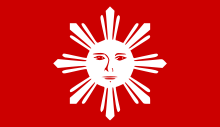Republic of Biak-na-Bato
The Republic of Biak-na-Bato ( Tagalog : Repúbliká ng̃ Biak-na-Bató , Spanish: República de Biac-na-Bató ) was the first provisional republic on Philippine soil, which arose in the wake of the Philippine Revolution . It was proclaimed in July 1897 by Emilio Aguinaldo , who declared himself president. The proclamation of the republic was not yet a declaration of independence from Spain , but a declaration of autonomy for the Philippines within the Spanish colonial empire.
The demands included the equality and equality of Filipinos before the law, seats in the Spanish parliament, freedom of the press and freedom of expression, land reform and the self-government of the Philippine archipelago. They leaned on the manifesto of La Liga Filipina José Rizals .
A constitution was drawn up by Felix Ferrer and Isabelo Artacho , which was based on the Cuban constitution of 1892. It is known as the Biak-na-Bato Constitution and is the first constitution in the history of the Philippines. It was signed on November 1, 1897 and came into force on November 15. Emilio Aguinaldo has now been officially declared President and Mariano Trias Vice-President.
Since the Spanish colonial authorities did not accept the demands and the republic of Biak na Bato, the caves of Biak-na-Bato were besieged by the Spanish troops. The newly appointed Governor General Fernando Primo de Rivera also saw the situation on his side hardly improved. In a statement he said, “I can take Biak-na-Bato without any problems. Any army can take it. But I can't end the rebellion with that. ”For this reason, he decided to shake hands with the revolutionaries for peace. The lawyer Pedro Paterno was chosen as the negotiator between the two sides. For four months he traveled back and forth between Manila and Biak-na-Bato. His work bore fruit when on 14-15. December 1897 the treaty of Biak-na-Bato was signed.
The Republic of Biak-na-Bato was officially dissolved on December 15, 1897. Emilio Aguinaldo and several dozen of his followers went into exile in Hong Kong , where they later founded the Hong Kong Committee to further support the revolution. It was succeeded by the First Philippine Republic , which declared itself completely independent.
